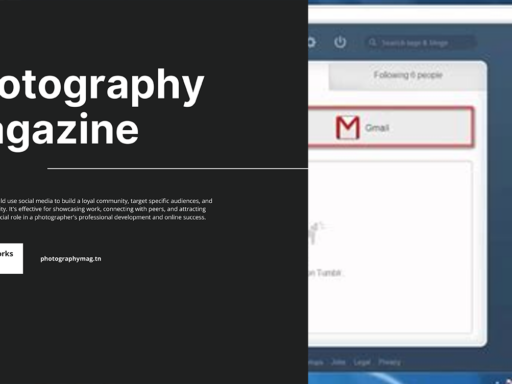So, Is Tumblr a Search Engine? Let’s Dive into the Chaos!
Ah, Tumblr—the whimsical internet playground where memes, fandoms, and the occasional philosophical musing collide into a glorious explosion of creativity (and cat gifs). But wait, do we slap that shiny title of “search engine” on it? Spoiler: not really. So let’s unravel this enigma and see what makes Tumblr tick, or tumble, or … well, you get the point.
In the grand safari of the internet, Tumblr hardly resembles your typical route taken by search engines like Google or Bing. Instead of using some wizardly sophisticated algorithms—like the kind that beats you in trivia night—Tumblr opts for a more laid-back approach. It thrives on the whims and fancies of its users, primarily relying on tags for categorization. Want to get into a deep discussion about how your favorite television show *should* end? Just tag it. Want to share that new painting of a cosmic cat you did last night? Tag that, too!
What’s All the Fuss About Tags?
Now, let’s get to the juicy bits—tags. Imagine a party where everyone hugs nametags instead of having actual conversations. That’s Tumblr for you! When you post anything—be it a snazzy GIF, a sizzling hot take, or the meme of the century—you toss tags on it like confetti. It’s all about labels here, folks! And those tags help others find your content through Tumblr’s search bar.
So, how does it work?
- Create a Post: You share your genius with the world.
- Slap on Tags: Keywords that might as well be the best dang treasure map ever created.
- Users Search: When someone types in “cats,” Tumblr uses those tags to show relevant posts. Search magic?
Bam! Just like that, your post might be seen by folks who share your passion for either cats or whatever obscure reason you found to put “cats” in the tags.
But Please, Don’t Call It a Search Engine!
Let’s get back to the important question here: is Tumblr truly a search engine? Answer: a resounding no! When you think of a search engine, you probably think of a giant, all-knowing robot ready to serve you results from the cavernous depths of the internet. Google takes a deep-dive into billions of web pages using complex algorithms that can rival the speed of light. It analyzes structures, context, and relevance, pairing your search queries with a chef-d’oeuvre of results, while also keeping an eye on ads (because let’s be real, they’ve got to make the bucks).
Tumblr, on the other hand? It says, “Hold my coffee!” and constrains itself to a mix of user-generated tags, chronology of posts, and popularity. While the effectiveness of tagging has its high points, particularly within dedicated communities (hey there, fellow weirdos!), it lacks the dynamic search capabilities that sophisticated algorithms provide. The end result is more like digging through your grandparent’s attic than navigating a well-oiled search engine. Have fun finding that long-lost comic book while tripping over old furniture!
Fun with Searches on Tumblr
So, what can you do on Tumblr if it’s not a search engine? You can still search for stuff! Just remember, your results will primarily be based on the tags (and when content was posted). It’s like a treasure hunt—but the treasure is mostly glittery and slightly chaotic.
Here are a few tips for maximizing your search fun on Tumblr:
- Tag-A-Palooza: Use broad and specific tags. For example, don’t just use “dogs.” Mix it up with “poodles” or “dog lovers” to get a diverse array of results.
- Keep it Current: Remember, Tumblr is all about the here and now. Older posts can fade into obscurity quicker than a hastily-typed tweet.
- Follow Tags: Yes, you can follow tags and see what the world is churning out. Think of it as curating your own special newsfeed, without the bitterness of rampant politics.
Is Tumblr for Finding Important Information?
If you’re hunting for something cool and easy, then sure! Tumblr is great for finding fan theories, artistic talents, and khm, whatever bizarre niche content you’ve fallen in love with this week. And yet, if you dare seek that shiny information gold that accompanies articles and scholarly work? Whooo, boy! Set your expectations to “Eh, whatever” territory because Tumblr isn’t your go-to resource for scholarly articles or deep-dive research.
The Dark Side: Spamming and Tag Manipulation
As is the case with any community-driven platform, Tumblr has its challenges. Users sometimes engage in tag abuse, misusing tags to drive attention to their posts—much like throwing an obnoxiously large neon sign at the saying, “Look at me!”
This can lead to the following:
- A cluttered search experience
- Raining down on actual target content
- Frustrating users hunting for legacy posts or with specific interests
As a dedicated Tumblr user, you could help squash that madness by tagging wisely and encouraging your friends to do the same. You know what they say, “With great power comes great responsibility!” (Or something like that; I might confuse comics with this wordy article).
That Moment When You Realize Why It’s NOT a Search Engine
In a nutshell, calling Tumblr a search engine is like calling your cat an accomplished figure skater—it’s just not accurate. Sure, you may discover some fascinating content, but you risk ending up in the rabbit hole of randomness. So what does that mean for you as a Tumblr user? Well, if you want quick-and-dirty access to content tied together by the whimsical concept of tags, then go ahead and enjoy the ride! Just don’t expect that tidy perfection served up like a five-star restaurant unless you are solely on a hunt for those cat GIFs.
In conclusion, Tumblr’s charm lies deeply in its chaos. You won’t find polished content like on Wikipedia, or tailor-made answers to your existential dilemmas. Rather, you will discover bits and pieces of the internet’s quirkiness. And isn’t that what keeps the internet alive and kicking?
Final Thoughts on Whether Tumblr is a Search Engine
So, is Tumblr a search engine? Nope! It doesn’t play in the same league as the big guns, doesn’t have the super-fast algorithms, or serve results like a Michelin-star restaurant. Instead, it embraces organized chaos with its tagging system and user content, offering a fascinating peek into niche interests and the occasionally profound corners of fandom culture.
In short, you need to approach Tumblr with the right mindset—like a delightful Saturday morning flea market rather than a well-groomed library. So tag away, embrace the randomness, and drink deeply from the well of collective creativity. Just remember, if you’re after accuracy, you might want to stick with Google for a bit.





